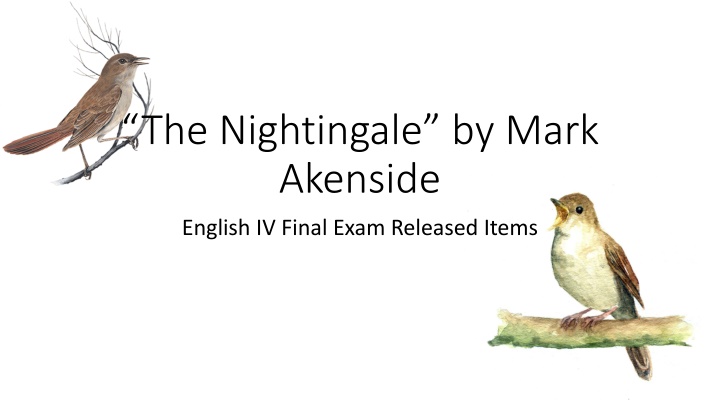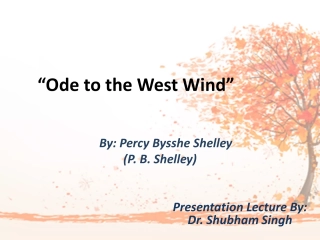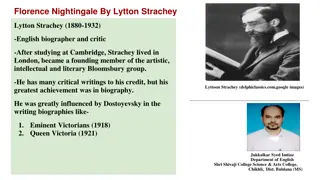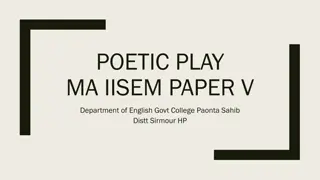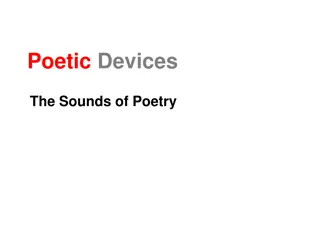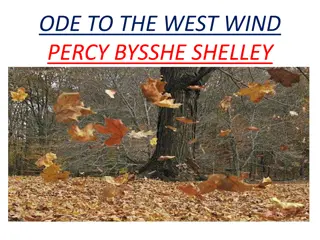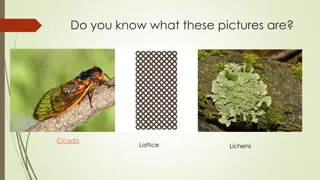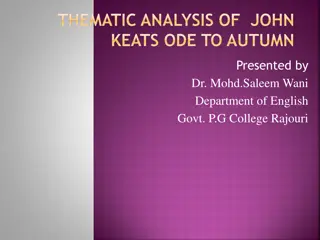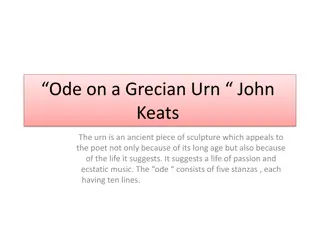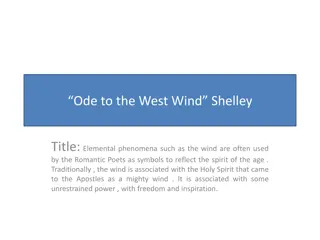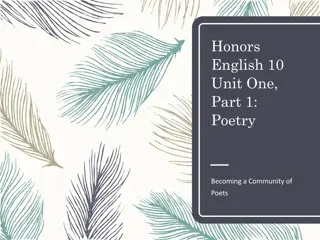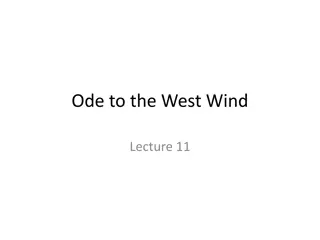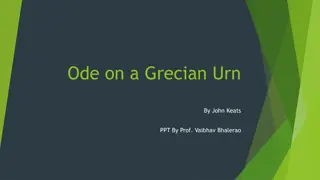The Nightingale by Mark Akenside: A Poetic Ode to Nature and Reflection
In "The Nightingale" by Mark Akenside, the speaker immerses himself in nature, finding solace and contemplation. The poem reflects on the beauty of the nightingale's song and the tranquility it brings, leading the speaker to ponder the fleeting nature of life and the universal sorrows and joys experienced by humanity. Through the enchanting melodies of the nightingale, the speaker seeks guidance, solace, and a temporary escape from the burdens of existence.
Download Presentation

Please find below an Image/Link to download the presentation.
The content on the website is provided AS IS for your information and personal use only. It may not be sold, licensed, or shared on other websites without obtaining consent from the author.If you encounter any issues during the download, it is possible that the publisher has removed the file from their server.
You are allowed to download the files provided on this website for personal or commercial use, subject to the condition that they are used lawfully. All files are the property of their respective owners.
The content on the website is provided AS IS for your information and personal use only. It may not be sold, licensed, or shared on other websites without obtaining consent from the author.
E N D
Presentation Transcript
The Nightingale by Mark Akenside English IV Final Exam Released Items
To-night retired, the queen of heaven With young Endymion stays; And now to Hesper it is given Awhile to rule the vacant sky, 5 Till she shall to her lamp supply A stream of brighter rays. Propitious send thy golden ray, Thou purest light above! Let no false flame seduce to stray 10 Where gulf or steep lie hid for harm; But lead where music s healing charm May soothe afflicted love.
To them, by many a grateful song In happier seasons vow d, 15 These lawns, Olympia s haunts, belong: Oft by yon silver stream we walk d, Or fix d, while Philomela talk d, Beneath yon copses stood. Nor seldom, where the beechen boughs 20 That roofless tower invade, We came, while her enchanting Muse The radiant moon above us held: Till, by a clamorous owl compell d, She fled the solemn shade.
But hark! I hear her liquid tone! Now Hesper guide my feet! Down the red marl with moss o ergrown, Through yon wild thicket next the plain, Whose hawthorns choke the winding lane 30 Which leads to her retreat. See the green space: on either hand Enlarged it spreads around: See, in the midst she takes her stand, Where one old oak his awful shade 35 Extends o er half the level mead, Enclosed in woods profound.
Hark! how through many a melting note She now prolongs her lays: How sweetly down the void they float! 40 The breeze their magic path attends; The stars shine out; the forest bends; The wakeful heifers graze. Whoe er thou art whom chance may bring To this sequester d spot, 45 If then the plaintive Siren sing, O softly tread beneath her bower And think of Heaven s disposing power, Of man s uncertain lot
O think, oer all this mortal stage 50 What mournful scenes arise: What ruin waits on kingly rage; How often virtue dwells with woe; How many griefs from knowledge flow; How swiftly pleasure flies! 55 O sacred bird! let me at eve, Thus wandering all alone, Thy tender counsel oft receive, Bear witness to thy pensive airs, And pity Nature s common cares, 60 Till I forget my own.
11 Which statement provides an objective summary of the text? A The speaker has lost his one true love. B The speaker uses nature to disregard problems. C The speaker is on a quest to find a nightingale. D The speaker is passionate about reading Greek mythology.
B The speaker uses nature to disregard problems.
12 What can be inferred from the poem? A The speaker is inspired by the bird s ability to sing beautifully despite the hardships of the world. B The speaker is critiquing how the bird s music can influence other people s view of the world. C The speaker is determined to show the world how a bird s music transforms lives. D The speaker is horrified that the world disrespects the power of a bird s song.
A. The speaker is inspired by the birds ability to sing beautifully despite the hardships of the world.
13 According to the first stanza of the poem, who is the queen of heaven ? A the nightingale B Hesper C Endymion D the sun
14 In the second stanza, what does propitious mean? A atrociously B discreetly C benevolently D instantaneously
15 What is the effect of using the word afflicted in the second stanza rather than the word grievous? A It shows that songs can heal the pain of love. B It conveys the idea that love is a choice that can harm. C It explains why men can become bitter and melancholic. D It describes a lonesome man instead of a jealous one
16 What is the effect of the use of the word choke in line 29? A It demonstrates there is no peace for the speaker. B It demonstrates there is no escape for the nightingale. C It illustrates how attractive this area is for the nightingale. D It illustrates how confusing this experience is for the speaker.
B It demonstrates there is no escape for the nightingale.
17 Based on stanza 8, what does Of man s uncertain lot mean? A It is arduous to make decisions. B Nature does not trust humans. C No one knows what will happen in life. D Love is difficult to maintain sometimes.
18 How does the author s choice of words in lines 49 54 impact the meaning of the poem? A The author s choice of words displays the difference between problems of humans versus nature. B The author s choice of words furnishes a reason to search for the nightingale. C The author s choice of words shows how unproblematic it is to begin a war. D The author s choice of words provides an outlet for the speaker s problems.
A The authors choice of words displays the difference between problems of humans versus nature.
19 What can be inferred from the last stanza of the poem? A The nightingale s song is beautiful no matter what. B The bird helps the speaker better understand nature. C The problems in nature outweigh the problems of the speaker. D The song of the nightingale helps the speaker to forget his own problems in life.
D The song of the nightingale helps the speaker to forget his own problems in life.
